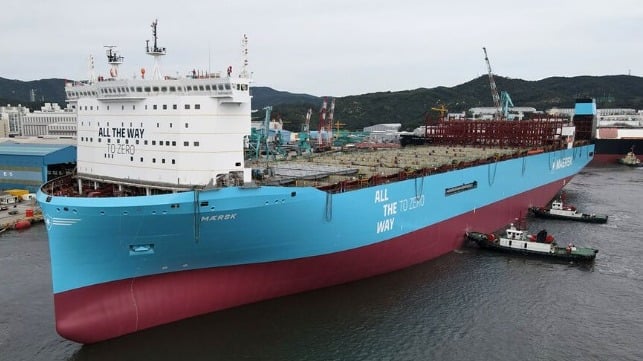DNV: Orders for Alternative-Fueled Vessels Grow with Methanol in the Lead

The pace of orders for alternative-fueled vessels continued to accelerate in 2023 achieving several key milestones according to DNV’s year-end analysis. They highlight that faced with increasing pressure to reduce greenhouse gas emissions, including stricter targets set by the International Maritime Organization in 2023, the maritime sector is considering a range of decarbonization options which propelled the newbuilding orders.
DNV on its Alternative Fuels Insight platform database recorded a total of 298 orders in 2023 for vessels able to run on alternative fuels. That brought the total of vessels on order to 1,281 ships overall with LNG and methanol continuing to gain traction while the first orders emerged for dual-fuel ammonia vessels. In total, DNV calculates that 15 percent of the orders included alternative fuels while only less than one percent of the vessels in operation today use alternative fuels.
Last year was especially significant as it marks 20 years showing the progress from no alternative fuels being used in 2003 to 628 vessels in 2023. Based on orders, DNV projects a total of nearly 1,500 vessels using all forms of alternative fuels in just five year’s time, by 2028.
“As we navigate towards a greener maritime future, the growing demand for alternative-fueled vessels speaks volumes,” said Knut Ørbeck-Nilssen, CEO Maritime at DNV. “These orders send pivotal signals to fuel providers and other important partners on shipping’s decarbonization journey. While it is clear that the maritime fuel technology transition is already underway, we now need to ensure the fuels powering these engines become available.”
The standout is methanol, which had its breakout year in 2023 and by a small margin is now the most popular alternative fuel choice. DNV highlights that there were 138 ships ordered able to employ methanol or to be refitted to use methanol versus 35 in 2022. With the introduction of the Laura Maersk as the first containership able to operate on methanol, the sector is set to lead the industry with a total of 106 methanol-fueled containerships now on order. However, equally important were the orders for bulk carriers (13) and car carriers (10) that will use methanol, and even the first cruise ship built methanol-ready, TUI Cruises’ Mein Schiff 7, is poised to enter service in 2024.
DNV’s principal consultant Martin Wold points out that methanol established itself as a mainstream technology option in 2023. “It managed to go neck and neck with LNG in record time,” writes Wold. DNV calculates that eight percent of the orders are now for methanol-fueled ships versus seven percent for LNG.
LNG-fueled vessels, however, also hit a milestone with the addition of 18 new orders in December. Currently, DNV reports there are 469 LNG-fueled vessels in service, but with the orders placed in 2023, LNG will surpass 1,000 vessels by 2027. Like with methanol, containerships were also the most active for LNG, with a total of 48 orders, but car carriers and tankers are also being ordered fueled by LNG. While a total of 130 LNG-fueled vessels were ordered in 2023, it was however down from 222 in 2022.
DNV highlights that the first orders for vessels due to run on ammonia (11) were also placed in 2023 with 10 newbuild deliveries expected by 2026. Bulk carriers have been leading the orders although gas tankers are also an early adopted and one tug as a demonstration scheduled to enter service.

that matters most
Get the latest maritime news delivered to your inbox daily.
Hydrogen although much talked about remains mostly aspirational at this point. DNV reports that the number of hydrogen-fueled vessels declined in 2023 to five from 18 in 2022, but testing and development are continuing. The second crew transfer vessel, and the first in Germany, to use hydrogen is beginning a year of testing this month and will be used to further refine CMB.TECH’s hydrogen injection approach. Other technologies such as batteries and fuel cells also continue to be in the developmental stage.
“Investments in alternative-fueled vessels have been heavily driven by the container and car carrier newbuild boom over the last three years,” notes Wold. He concludes by saying, “It remains to be seen if this trend continues into 2024.”
